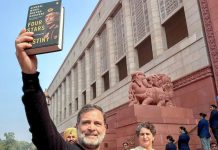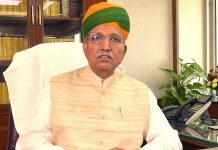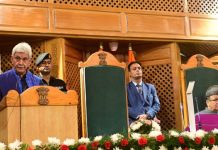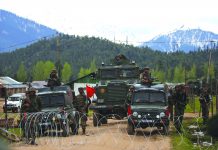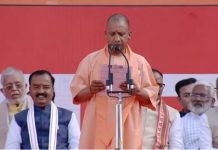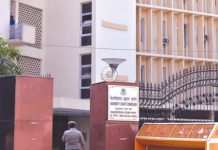
The agitation continues in Punjab, Haryana, western UP and other states while thousands of farmers remain at Delhi’s borders with Haryana and UP. BKU leader Rakesh Tikait has said that farmers’ movement will not end until the 3 contentious laws were rolled back., writes AMIT AGNIHOTRI.
There is no end in sight to the farmer protests against the three central laws even as the agitation completed one year on September 17. The farmer groups are adamant that the three laws be repealed while the government only wants to discuss certain clauses.
The protests had erupted all across the country soon after the three laws were passed by Parliament last year. The agitation continues in Punjab, Haryana, western Uttar Pradesh and other states while thousands of farmers remain at Delhi’s borders with Haryana and UP since November 26, 2020.
As part of the protests, Kisan Mahapanchayats have been held in September in Muzaffarnagar in western UP and Kurukshetra in Haryana, while more such gatherings are being planned by the Samyukta Kisan Morcha (SKM), an umbrella body of 40 farmer groups, to take the agitation forward.
The SKM also organised a Bharat Bandh on September 27 days after Haryana Bharatiya Kisan Union chief Gurnam Singh Chaduni reiterated that the protesting farmers will not move from the Delhi borders till the three farm laws were repealed.
“Stop dreaming of opening the borders,” Chaduni said while addressing a ‘Kisan Mahapanchayat’, in Kurukshetra, where a large number of farmers had gathered despite inclement weather.
Before that, Haryana had constituted a special committee to begin talks with farmers on opening Delhi borders and said the panel would work in compliance with the August 23 orders of the Supreme Court that had asked the Centre and the governments of Uttar Pradesh and Haryana to find a solution to the issue of the road blockade while keeping the farmers’ right to protest in mind.
The special committee was to hold talks with the SKM on September 20 but the farmers refused to attend the meeting saying they had kept the roads open.
“The Government of India has been adamant about not fulfilling the farmers’ rightful demands, and has not initiated any talks with farmers’ representatives after January 22, 2021,” a statement from SKM said.
“The Government does know where the solution lies and has been vengefully obstinate about putting protesting farmers through many hardships, even though more than 600 protestors have been martyred so far. It is shameful that an elected government in the world’s largest democracy is putting its citizens through such a struggle for saving their own livelihoods and future,” the statement added.
“Farmers have been prevented by Haryana and Delhi Police which put up barricades and blocked the roads. It is not the farmers who have blocked the roads. In fact, protesting farmers have created clear paths on both sides of the road at Singhu border as well as Tikri border for traffic to move, and have been forced to occupy only one side of the road at Ghazipur border. Same is the situation at Shahjahanpur border and other protest sites,” the statement further said.
Earlier, protesting farmers had called off their stir in Karnal after the Haryana government ordered a judicial probe into August police lathi-charge on demonstrators.
On August 28, 10 people were injured when Haryana Police lathi charged a group of protesting farmers who were trying to head to the venue of a state BJP meeting in Karnal.
During the incident, a video of former Karnal Sub-Divisional Magistrate Ayush Sinha purportedly telling police personnel to “break the heads” of anyone who tried to cross the barricades went viral.
After the farmers protested outside the mini-secretariat, the officer was transferred on September 2 posted as additional secretary of Citizen Resources Information Department.
“A judicial inquiry into the incident (lathi-charge) at the Bastara toll plaza on August 28 will be conducted by a retired high court judge and the judge
will submit the report in one month. During the investigation, IAS officer Ayush Sinha will remain on leave,” said additional chief secretary Haryana Devender Singh in a joint conference with farmer leaders.
The additional chief secretary also announced that government jobs would be given to two family members of a farmer, who, the protesters claimed, died after being injured during the lathi charge. The administration had earlier rejected this claim.
The farmers have been opposing the public functions of the BJP-JJP leaders in Haryana over the farm laws.
As the national capital was at the receiving end of a record downpour recently, BKU national spokesperson Rakesh Tikait, along with a few supporters, stayed put on a waterlogged road at Delhi’s Ghazipur border.
Against the backdrop of police barriers topped with barbed wire, Tikait and other farmers were seen sitting in waist-deep water.
Early September, thousands of farmers from Uttar Pradesh and neighbouring states showed up in strength in Muzaffarnagar after the SKM sounded the call for a Kisan Mahapanchayat.
“India is for sale, this is the government’s policy,” said Rakesh Tikait, adding, “We have to stop the country from getting sold. Farmers should be saved, the country should be saved; business, employees and youth should be saved — this is the aim of the rally.”
He asserted that the farmers’ movement will not end until the three contentious laws were rolled back by the central government. “When the government of India will invite us for talks, we will go. The farmers’ agitation will continue until the government fulfils our demands,” the BKU leader said.
Tikait reiterated his pledge to continue the protests at Delhi border. “We take a pledge that we will not leave the protest site there (at Delhi borders) even if our graveyard is made there. We will lay down our lives if needed, but will not leave the protest site until we emerge victorious,” he said at Kisan Mahapanchayat in Muzaffarnagar.
BKU media in-charge Dharmendra Malik said farmers belonging to 300 organisations spread across different states like Uttar Pradesh, Haryana, Punjab, Maharashtra, Karnataka, among others, had gathered for the event.
The SKM, which is spearheading the farmers’ agitation against the Centre’s three farm laws, said the event proved that the agitation had the support of “all castes, religions, states, classes, small traders and other sections of society.”

Protests and politics
Farmer leaders made it amply clear that they would campaign against the ruling BJP in Uttar Pradesh and Uttarakhand assembly elections in 2022 if their demands were not accepted.
They even threatened to continue their agitation till 2024 when Lok Sabha elections are due. “This government should be given ‘vote ki chot’. The slogan of ‘fasalon ke daam nahi, to vote nahi’ (no fair price for crops, no votes) will have to be raised,” Rakesh Tikait said at the mega rally.
The SKM said, “The Mahapanchayat will make the Modi and Yogi governments realise the power of farmers, farm labourers, and supporters of the farm movement.”
Tikait had even campaigned against the Centre in the West Bengal assembly polls and later met Chief Minister Mamata Banerjee, who promised to support and expand the protests.
There have also been suggestions that the farmers should join electoral politics as the government was not responding to the protests but the peasants are divided on the issue.
Opposition support
Congress leader Rahul Gandhi said the call of truth was echoing and an “unjust government” would have to listen.
Congress general secretary Priyanka Gandhi Vadra said that the “arrogance of power” cannot withstand the roar of the farmers.
CPI-M’s Sitaram Yechury extended the full support of his party and other Left parties to the ongoing farmers’ agitation.
Bahujan Samaj Party too demanded that the Centre should accept the demands of farmers who have been protesting against the three farm laws.
Punjab’s main opposition party – the Aam Aadmi Party (AAP) – observed September 17 as “black day” on the completion of one year of the enactment of the Centre’s three farm laws.
AAP held candle marches across the state to pay tribute to the farmers who died during the ongoing agitation against the farm legislations.
The Shiromani Akali Dal (SAD) also observed September 17 as “black day” and staged protests in the state as well as in Delhi from Gurdwara Rakabganj to Parliament where party leaders Sukhbir Singh Badal and his wife Harsimrat Kaur courted arrest.
However, the BJP termed the ‘Kisan Mahapanchayat’ an “election meeting” and accused its organisers of indulging in politics with assembly polls approaching in a number of states, including Uttar Pradesh.
Union minister Anurag Thakur said, “Senior ministers held not one but 11 rounds of meetings with farmers. The agriculture minister, many times in various press briefings had said that the government is always open to discussions. There has been a record increase in the MSP as well as the procurement by the government. All this has been done in the interest of the farmers.”
Punjab campaign
Farmer bodies appealed to political parties to suspend their poll campaign till the schedule for the Punjab assembly polls was out so that the focus remained on the agitation.
Farmer leader Balbir Singh Rajewal said, “We appeal to parties that electioneering should not be held before the polls are announced. The party, which will still insist on running a poll campaign before poll dates are announced, we will consider them as against the farmers’ agitation.”
“As our agitation is going on and a different kind of situation prevails currently, farmers’ attention is focused on the protest. When parties conduct electioneering and mobilise supporters for their programmes, it diverts their attention,” he said.
Some other farm leaders said representatives of political parties were asked not to indulge in electioneering or hold political rallies till the elections are announced as it may hurt the farmers’ struggle. However, they said parties were free to hold small functions which do not attract big gatherings.
After a meeting of 32 farmer bodies, Rajewal said most parties in Punjab asserted that they stand behind farmers in their agitation.
The agitation
Alarmed at the large-scale farmer protests last year, the Centre had stopped movement of passenger and freight trains in Punjab citing security concerns.
This resulted in shortage of raw materials like coal for power plants and fertilizer for the wheat crop in Punjab and induced losses to the state exchequer forcing the Amarinder Singh government to buy electricity from the national grid.
The Punjab CM staged a protest in the national capital but to no avail. As the Centre remained unresponsive to their demand, the various farmer groups decided to take their protest to Delhi.
As thousands of farmer groups from Punjab and Haryana marched through Haryana to reach the national capital in November 2020, they had to face police brutality in the state and later braved water cannons in cold winter mornings at north Delhi’s Singhu border.
At first, the Centre tried to discourage the farmers by denying them entry in Delhi, but later relented when many of them faced lathi-charge as they broke through the police barriers to enter the city. Realizing there was no escaping the determined farmers, the Centre invited them for talks.
Prime Minister Narendra Modi had backed the farm laws indicating the Centre was in no mood to repeal the legislation.
In January 2021, the Supreme Court stayed the implementation of the three laws till further orders and appointed a four-member expert panel to talk to the farmers and find a solution.
In June, the farmers staged dharna outside Governor Houses in states and submitted a memorandum to President Ram Nath Kovind to mark seven months.
Earlier, Union Agriculture Minister Narendra Singh Tomar and Food Minister Piyush Goyal held 11 rounds of talks with the protesting farmer unions but there was no positive outcome.
tehelkaletters@gmail.com

